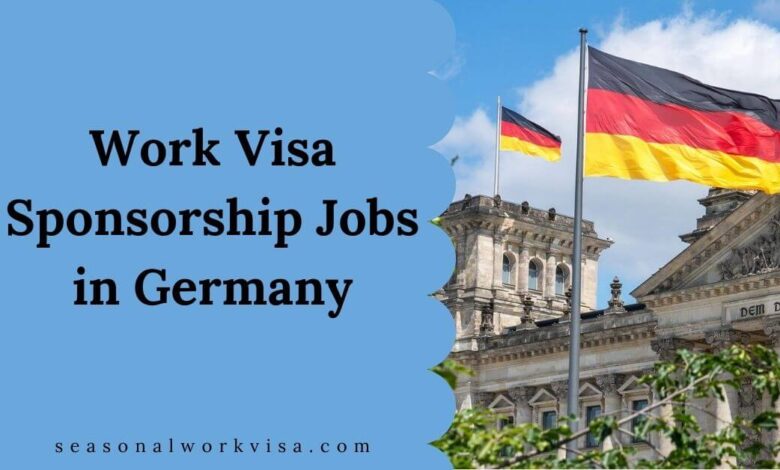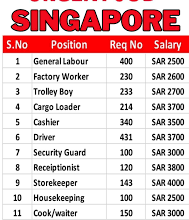Skilled Jobs in Germany for Africans in 2025

Germany, Europe’s economic powerhouse, is increasingly opening its doors to skilled workers from across the globe — including Africa. With a rapidly aging population and a growing shortage of professionals in key sectors, Germany is actively seeking foreign talent to fill vital roles in healthcare, engineering, IT, construction, and other technical fields. For skilled Africans, this represents a golden opportunity to build a career in one of the world’s most developed economies, with the added benefit of long-term settlement prospects.
Here’s a comprehensive guide to skilled job opportunities in Germany for Africans in 2025, including the types of jobs in demand, visa options, application steps, and tips for a successful transition.
Why Germany Is Hiring Skilled Workers from Africa
Germany’s skilled labor shortage is well-documented. The country needs at least 400,000 skilled immigrants per year to maintain its economic strength, according to the German Institute for Economic Research. With declining birth rates and an aging workforce, sectors such as healthcare, engineering, IT, and skilled trades are struggling to find enough qualified professionals.
To address this, Germany introduced the Skilled Immigration Act (Fachkräfteeinwanderungsgesetz) in 2020, which was further expanded in 2023 to make it easier for skilled non-EU nationals — including Africans — to live and work in Germany legally.
In-Demand Skilled Jobs for Africans in Germany
The following fields currently have strong demand for skilled workers from abroad:
1. Healthcare and Nursing
-
Nurses, geriatric caregivers, and medical technicians are in high demand, especially in hospitals and elderly care facilities.
-
Foreign-trained nurses must undergo recognition of qualifications but can work under supervision while completing the process.
2. Engineering
-
Civil, electrical, and mechanical engineers are urgently needed, especially in infrastructure, automotive, and energy sectors.
-
Germany’s Green Energy transition (Energiewende) is creating new roles in environmental engineering and renewable energy.
3. Information Technology (IT)
-
Software developers, system administrators, cybersecurity specialists, and data analysts are consistently sought after.
-
Many companies offer English-speaking roles in tech hubs like Berlin, Hamburg, and Munich.
4. Skilled Trades
-
Electricians, plumbers, welders, and construction workers are needed in large numbers.
-
Vocational training qualifications (TVET) from African countries may be recognized or partially credited.
5. Science, Research, and Teaching
-
Researchers, university lecturers, and science professionals in mathematics, physics, and chemistry have ample opportunities, especially in academic and industrial research institutions.
6. Hospitality and Gastronomy
-
Cooks, hotel managers, and service staff with training and experience are welcomed in tourism-heavy regions.
Work Visa Options for Skilled Africans
To legally work in Germany, African jobseekers must apply for a suitable visa based on their qualifications and job offer. The most relevant options include:
1. Skilled Worker Visa (Qualified Professionals)
-
For individuals with recognized vocational training or a university degree.
-
Requires a job offer in your field of qualification.
-
Visa is valid for up to 4 years and can lead to permanent residence.
2. EU Blue Card
-
For university graduates with a job offer paying at least €45,300/year (or €41,041 for shortage occupations like nursing or engineering).
-
Faster path to permanent residency (33 months or 21 months with German proficiency).
3. Job Seeker Visa
-
Allows skilled professionals to enter Germany for up to 6 months to search for a job.
-
Requires proof of qualifications, financial means, and health insurance.
-
Once a job is secured, the visa can be converted into a work visa without leaving the country.
4. Recognition Visa
-
For those whose qualifications are not yet recognized in Germany.
-
Allows entry and residence while completing adaptation training or exams.
-
Often used by nurses and skilled tradespeople.
Steps to Apply for a Work Visa
-
Check Qualification Recognition
Use the “Recognition in Germany” portal to verify if your degree or training is recognized. If not, apply for recognition via the relevant German authority. -
Secure a Job Offer
Use platforms like: -
Prepare Documentation
Gather your:-
Passport
-
Recognized qualification documents (translated into German/English)
-
Job contract
-
Proof of financial means (for Job Seeker Visa)
-
Health insurance
-
-
Apply at the German Embassy
Schedule an appointment, submit your documents, and attend an interview at the German embassy or consulate in your home country. -
Relocate and Register
Upon arrival, register your address at the local registration office (Einwohnermeldeamt) and apply for a residence permit.
Tips for a Successful Transition
-
Learn German: Most skilled jobs, especially in healthcare and trades, require at least B1-level German proficiency. Language skills also ease integration and increase your chances of long-term success.
-
Build Your CV to German Standards: Include detailed work experience, formal education, and references. Use the Europass CV format if unsure.
-
Be Prepared for Adaptation Training: Some professions may require additional coursework or exams in Germany.
-
Connect with Diaspora Networks: African communities in Germany (Nigerian, Ghanaian, Cameroonian, etc.) can provide support and advice.
-
Consider Family Reunification: Many skilled worker visas allow you to bring your spouse and children, who may also have access to work and education.
Germany is not just open to skilled African professionals — it is actively seeking them. Whether you’re a nurse, software engineer, electrician, or academic, the door is open through structured immigration pathways and growing demand. With proper qualifications, German language skills, and a proactive approach, you can secure a rewarding career and a stable life in one of Europe’s most dynamic economies.
2025 is a great year to take the step. Germany needs your skills — and you could be part of the future shaping its workforce.
Source: Thepressradio.com





